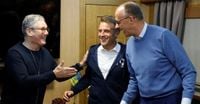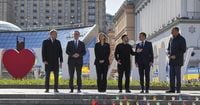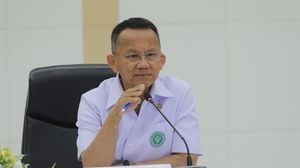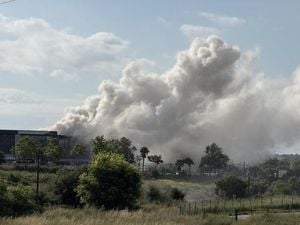On May 10, 2025, leaders from France, Germany, Poland, and the United Kingdom gathered in Kiev to demonstrate solidarity with Ukraine amid ongoing conflict with Russia. This historic meeting marked the first time these four European leaders visited Ukraine together, with German Prime Minister Friedrich Merz making his initial trip to the country in his new role.
The gathering included British Prime Minister Keir Starmer, French President Emmanuel Macron, Polish Prime Minister Donald Tusk, and Merz, who met with Ukrainian President Volodymyr Zelensky and First Lady Olena Zelenska at a railway station in the capital. The leaders expressed their unified support for a proposal put forth by U.S. President Donald Trump in March, advocating for an immediate 30-day ceasefire to facilitate peace negotiations.
During the meeting, the leaders reiterated their backing for Trump’s call for a peace agreement, urging Russia to ensure a lasting peace. "We reaffirm our support for President Donald Trump's call for a peace agreement and urge Russia to guarantee a lasting peace," the European leaders stated in a joint declaration. They, alongside the U.S., called for a complete and unconditional ceasefire to create a conducive environment for discussions regarding a fair and lasting peace.
In a related development, the five leaders planned to hold an online meeting later that day to update other world leaders on the progress of a proposed "voluntary alliance" aimed at supporting Ukraine's armed forces following a potential peace agreement. This plan may involve deploying troops to Ukraine for monitoring purposes.
On the same day, Kremlin spokesman Dmitry Peskov remarked that Russia would be open to a temporary ceasefire if military aid to Ukraine from other countries ceased. In an interview with ABC News, Peskov noted that Russian President Vladimir Putin is committed to resolving the Ukraine conflict through diplomatic means and expressed hope that U.S. mediation would aid in resolving the ongoing tensions.
The presence of the European leaders in Kiev came just a day after Russia concluded its Victory Day Parade in Red Square, commemorating the 80th anniversary of the end of World War II. The timing of the visit underscored the ongoing geopolitical tensions in the region.
During their discussions, the European leaders emphasized the need for an immediate and unconditional ceasefire in Ukraine to pave the way for negotiations. Ukrainian Foreign Minister Andrii Sybiha stated, "Ukraine and all allies are ready to implement a complete and unconditional ceasefire on land, in the air, and at sea for at least 30 days, starting from May 13, 2025."
Before the summit, a French diplomatic source revealed that if Russia were to reject the ceasefire proposal, the European leaders would consider imposing additional sanctions on Moscow. Peskov, however, indicated that Russia supports the idea of a ceasefire but requires a thorough assessment of the complex factors involved.
As the situation unfolds, the European leaders have made it clear that they are prepared to support Ukraine in its quest for peace, with a unified front against Russian aggression. They have warned that failure to comply with the ceasefire could lead to new sanctions, although details on these potential measures remain unfinalized.
This meeting not only highlights the ongoing commitment of European nations to support Ukraine but also reflects the broader international efforts to seek a resolution to the conflict. The call for a ceasefire and peace negotiations signifies a critical juncture in the ongoing war, with hopes that diplomatic efforts can lead to a sustainable resolution.
The leaders' visit to Ukraine serves as a potent reminder of the solidarity among European nations and their determination to support Ukraine against external threats. As the world watches closely, the coming days will be crucial in determining the future of peace in the region.





